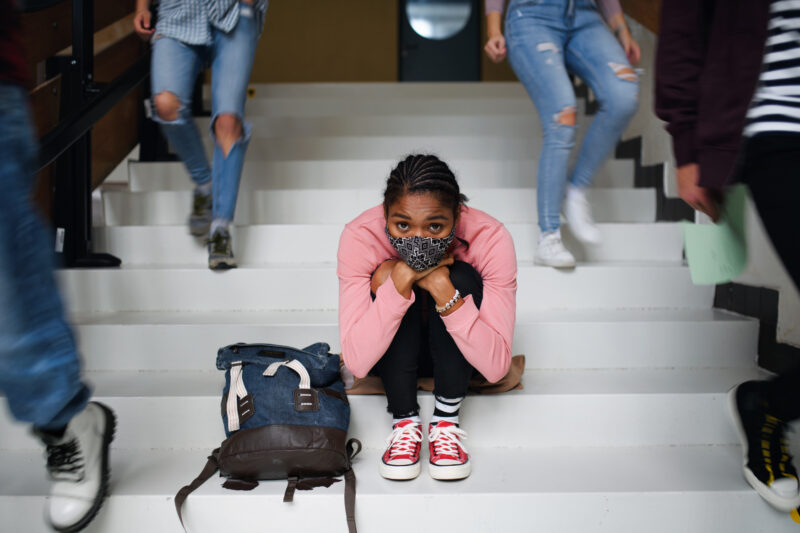The Holiday Season Isn’t Always Jolly
We might be familiar with Hallmark movies on the TV, houses decorated with lights, toy-filled stores, and for some, lots of travel during the holiday season. However, for many people, the holiday season isn’t so jolly. It can be associated with stress, anxiety, and depression. In fact, our aggregated data from all schools using the BASEline Assessment shows that scores for academic self-confidence, engagement, and behavior drop at this time of year. (Schools using BASEline generally administer their second assessment between December and March.)

Additionally, a NAMI (National Alliance on Mental Illness) study showed that 64% of people with an existing mental illness report the holidays making their conditions worse. Unfortunately, these experiences are true for students too.
There are a variety of contributing factors that may negatively impact a student’s mental health during the holiday season. In this article, we will look at some of those factors and provide strategies that you and your fellow educators can use to support students at this time of year.
Factors Contributing to a Decline in Student Mental Health During the Holidays
Home Environment
One factor that contributes to a decline in mental health for some students during the holiday season is their homelife situation. Some students have the good fortune to live in a stable home environment where they can relax and enjoy the break. However, there are other students who are not so lucky. Some students may go to broken homes where they experience violence and conflict. Some will go to homes where they are required to take care of younger siblings because their parents have to work. Some, depending on their economic situation, have to find jobs during the holidays to help their families, and some may have no home at all.
Holiday Blues
Another factor that can contribute to a decline in student mental health during the holidays is something known as “The Holiday Blues.” According to Discovery Mood & Anxiety Program, the holiday blues is a “temporary undefined condition that commonly presents itself with a sad mood around the holidays.” Students can feel this way due to a recent loss of a loved one, fear of being alone, financial burdens being reflected by the parent or caregiver, and changes in routine. A decline in a student’s academic and behavioral performance is often associated with the holiday blues during this season.
COVID
A new factor that has been increasing stress and anxiety among students during the holiday season is COVID. As we enter our third holiday season since the pandemic, many students feel the stress and anxiety that comes with gathering with family members. There is a fear of losing loved ones, getting sick, having to quarantine because of their school policies, and feeling isolated once again. A study done by SESAME showed that 64% of Americans feel an increase in COVID-19-related stress. Even if the student is not greatly concerned about COVID, they can absorb some of the stress and anxiety that surrounds them, increasing the likelihood that they too can feel stressed and anxious.
Feeling Left Out
Finally, not all students celebrate a religious or cultural tradition at this time of year. Those who do not, may feel left out or isolated when they see many of their classmates coming together around holiday traditions.
How To Support Student Mental Health During the Holidays
So, how can educators help students cope with mental health challenges during the holidays? Here are some strategies to support students’ wellbeing during the holidays and increase the likelihood of positive outcomes for those who may be struggling.
Raise awareness among educators
It is important for educators to understand that there are students who might not be enjoying the holiday season as much as their peers or themselves. By raising awareness about different student experiences, you can help educators be better equipped to foster an inclusive environment and recognize the need to be more empathetic when students begin to “misbehave” or “act out” during the holiday season.
Provide support for your students
One way educators and schools can provide support is by creating an environment where students feel comfortable expressing their feelings. Being in a safe space can help students confront their feelings and mental health challenges during the holiday season. Support can also come in the form of providing advice, easy access to counselors and school psychologists, resources for the classroom, and equipping teachers with tools to handle crisis situations.
Avoid adding additional stress on students
It is common for educators to assign “holiday packets” during the winter break. For some students, this can result in increased stress and added anxiety. Additionally, students who are not able to complete their homework may experience a negative impact on grades and performance which can also contribute to increased stress and anxiety.
In every class there will likely be students for whom the winter break does not mean enjoying the holidays and having fun. Therefore, it is beneficial for students to enjoy their time in school, so encourage educators to lighten the load during the holiday season and be supportive of fun and engaging lesson plans.
Equip students with social-emotional skills
Whether students are feeling anxious, stressed, or depressed during the holiday season, BASE Education continues to provide helpful resources and a platform in which you can connect deeper with your students. With modules such as:
- Coping Strategies
- Families
- Worries
- Anxiety
- Coronavirus
- And Stress Management
Educators can equip students with social-emotional skills to help them process the negative effects on their mental health during the holiday season.
Visit our SEL curriculum page for a full list of our modules or request a demo to see how our platform works.



